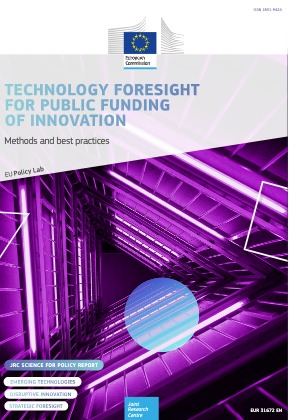Anticipatin and monitoring of emerging technologies and disruptive innovation (ANTICIPINNOV) project is a collaboration between the European Commission Joint Research Centre (JRC) with the European Innovation Council (EIC) 2023-2024 to strengthen strategic intelligence capacity through the use and development of anticipatory approaches. Learn more about the project from its's three different branches.
Everybody is looking into the Future! A literature review of reports on emerging technologies and disruptive innovation
Growing volatility, uncertainty, complexity and ambiguity, present leading challenges in policy-making nowadays. Anticipatory thinking and foresight are of utmost importance to help explore trends, risks, emerging issues, and their potential implications and opportunities in order to draw useful insights for strategic planning, policy-making and preparedness. The findings include a set of 106 signals and trends on emerging technologies and disruptive innovations across several areas of application based on a review of key reports on technology and innovation trends and signals produced by public and private entities outside of the EU institutions. Its goal is to strengthen the EIC’s strategic intelligence capacity through the use and development of anticipatory approaches that will - among other goals – support innovation funding prioritisation. Other insights were extracted, namely those related with the scope of the EIC Programme Manager portfolios.
Read EU Policy Lab blog post :Everybody is looking into the future: a technology foresight perspective
Scanning deep tech horizons: Participatory collection and assessment of signals and trends
The Joint Research Centre (JRC) and the European Innovation Council (EIC) conducted a series of Horizon Scanning exercises across six EIC programme managers’ (PM) portfolios as part of an ongoing collaborative effort to strengthen EIC strategic intelligence capacity through the use and development of anticipatory approaches. The fields covered include: Space Systems & Technologies; Quantum Technologies; Agriculture & Food; Solar Fuels & Chemicals; Responsible Electronics and Architecture, Engineering & Construction. The main findings of this Horizon Scanning – the identification and analysis of ‘signals’ from nascent research, technologies, or trends on the periphery of the mainstream – show opportunities for investment in emerging technologies and breakthrough innovations that can advance EU competitiveness while also serving to support the EU’s long-term policy and societal visions.Other insights were taken from this exercise, namely the identification of drivers, enablers and barriers to technology development and adoption, that could be the starting ground of further foresight exercises and policy initiatives. The report highlights three main themes – sustainability, energy, and scalability, which are overarching across signals, drivers, enablers and barriers. And concludes with a series of recommendations to streamline Horizon Scanning activities in the specific context and needs of the EIC.
Read EU Policy Lab blog post: Technology foresight: anticipating the innovations of tomorrow
Technology Foresight for Public Funding of Innovation: Methods and Best Practices
In times of growing uncertainties and complexities, anticipatory thinking is essential for policymakers. Technology foresight explores the longer-term futures of Science, Technology and Innovation. It can be used as a tool to create effective policy responses, including in technology and innovation policies, and to shape technological change. In this report we present six anticipatory and technology foresight methods that can contribute to anticipatory intelligence in terms of public funding of innovation: the Delphi survey, genius forecasting, technology roadmapping, large language models used in foresight, horizon scanning and scenario planning. Each chapter provides a brief overview of the method with case studies and recommendations.The insights from this report show that only by combining different anticipatory viewpoints and approaches to spotting, understanding and shaping emergent technologies, can public funders such as the European Innovation Council improve their proactive approaches to supporting ground-breaking technologies. In this way, they will help innovation ecosystems to develop.



